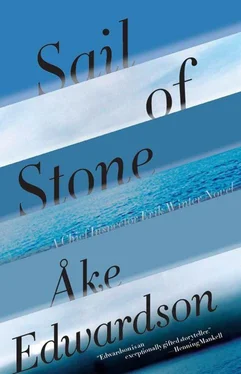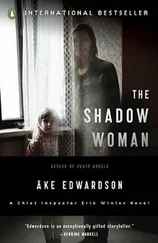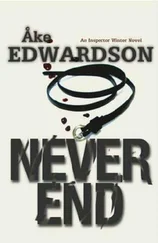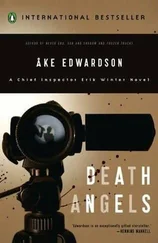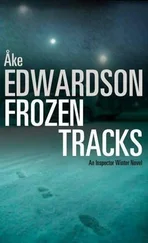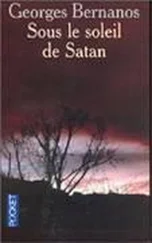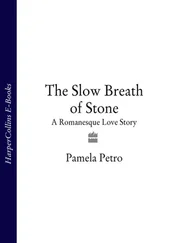They had stocked up a few times in Buckie. Maybe it was only twice. Arne had wanted to stay. Not this time, they had said. We’ll come back. That was the last time. The Buckie boys are back in town, Arne had said when they docked. He repeated it as they drank beer at the Marine.
They had gone out at the same time as the Monadhliath. It was the next day.
The Monadhliath had run into drifting mines. That was another day later. He might have heard the explosion. He had seen a light in the night.
Two hours later the Marino had gone under.
He had convinced Bertil not to come along. No. He had forced him not to! That was in Fraserburgh. They had received their final instructions.
Arne wasn’t coming along anyway. He had a meeting in the mountains. He traveled hidden under a tarp in the bed of a truck. More weapons. Always more weapons.
Arne didn’t know German. Others knew German.
Egon came along out to sea. He couldn’t force him to stay on land. He tried. Egon forced himself along on the last trip.
He didn’t speak to Frans. They weren’t speaking to each other anymore. Only when necessary. Only if the worst happened.
“John, you are lost,” Frans had said.
“We’re all lost,” he had said.
Frans had talked about Ella. Crazy talk, insane. Frans had accused him. Don’t try to take her, he had said. Ella is mine. It was insane. It was lies. Frans drank. Frans talked like a madman. Frans was careless with the weapons. Frans was afraid.
Egon looked afraid. Egon stayed away. Egon kept to himself in the mess. Egon was afraid.
He stood in the cabin. He drank. He froze. He listened to the wind. He was afraid. He had a premonition. He hadn’t been able to explain it to Egon.
A gale was blowing when they went out, sheltered by the cliffs of Clubbie Craig.
The meeting was outside of Troup Head. He couldn’t see the village in there under the cliffs. Everything was dark. Suddenly they could see the signal above Cullykhan Bay. The other boat came out.
They went north. They unloaded and loaded up again. They kept going. They unloaded. They kept going. The wind increased. They couldn’t go home yet. They went into the storm.
He wasn’t afraid now. Egon was afraid.
Frans wasn’t afraid. Frans came into the cabin. Frans was waving a German army pistol.
“Should we shoot the haddock?” he screamed.
He didn’t answer. There was a strong gust. Frans reeled.
“We have lots of these!” screamed Frans, waving the pistol. “And bigger ones too!” He waved it again. “We can shoot whales!”
Frans had stolen weapons. How much had he stolen?
It was punishable by death. It didn’t matter how little you kept. Or how much.
Almost everything was punishable by death.
“Put that down,” he yelled.
“Should we set the trawl?” Frans screamed. “Ha ha ha!”
“Go belowdecks,” he yelled.
Frans lost his balance in the rough sea. The Marino fell, fell twenty yards, thirty. The sea was crazy. The water was a wall. The water was hard as stone. The water was a stone wall. The water was death.
Frans dropped the pistol, then picked it up. Frans lost his balance. Then Frans was on his way out, a yard from the door. He reeled suddenly.
Egon was on his way in. The storm threw him in.
A shot went off. Another shot.
Egon exploded. Egon’s head split. Egon’s body fell.
Frans was still holding the pistol in his hand. He dropped it. He ran out through the cabin door.
Egon was motionless on the wet floor. The water rushed in through the doorway.
He turned the rudder. He dragged the body to shelter. He looked for Frans. He called his name through the storm. Frans didn’t answer. He knew that he was still on board. He found him. Frans tried to say something. He didn’t listen. Frans looked at him. He closed his eyes.
Jesus!
They landed at Inverness Airport at eleven thirty. The sun was out, but it was low and weak. In the taxi to the city Winter saw an open landscape and a glimpse of water to the north and the silhouettes of the big mountains south of the city. It was the Highlands.
“They’re higher than I thought,” said Angela. “It’s beautiful.”
Inverness was built of old and new. Loathsome concrete roundabouts spun their way in toward a medieval downtown. They could see the castle high above. The taxi slowly made its way through town and crept along the river Ness. They passed a bridge and continued on Ness Bank along the river for five hundred yards and stopped outside the little Glenmoriston Hotel, which Winter had booked on Macdonald’s recommendation. Cozy and well kept and expensive, as Macdonald had said.
The room was large and it was on the second floor, and they had a panorama view over the river and the park beyond it, as well as the three-hundred-year-old granite houses on either side of the cathedral. Winter opened the window. The wind was still warm. He could see people on park benches on the other side. It wasn’t far. Gulls circled over the benches. Pigeons hopped around them. People were eating their lunches on the benches, spread-out papers of fish and chips. Haddock that had been pulled up by Erik Osvald. Potatoes that had been delivered by Steve Macdonald’s dad. Vinegar from whatever distillery was available.
Winter could see two bridges over the river. It was still early October, but the sky above the river was very low and had a color like stone; the sun was gone now.
The sky brushed the bridges.
Angela stood beside him.
“The ceiling’s a little low here,” she said, looking out at the sky.
“I’ve never seen anything like it,” said Winter.
“Haven’t you been here before?”
“That was in the summer. The sky was blue, if I remember correctly.”
“Don’t you always remember correctly?”
She smiled kindly.
“Not anymore,” said Winter, thinking of Arne Algotsson. No one knew what was in store, at least if you didn’t analyze your DNA. He didn’t intend to do that.
Angela hung up some clothes. He let his bag lie unopened. She sat on the bed, which was large and yet looked small in the room.
“I like this room,” she said.
Winter looked in the bathroom, which was tiled in a warm shade. It was the same color as the low sky outside.
“Nice hotel,” he heard Angela say behind him.
It was. The lobby was small but not too small. To the right there was an inviting bar with leather chairs and a counter and shelves well stocked with bottles. To the left was the restaurant.
“I’m going to call home,” said Angela.
He washed his hands and heard her voice and walked out into the room. She held out the phone: “Elsa.”
He took it and heard his daughter, who had already started telling him what had happened during the day. No day care while they were gone. Elsa was totally the center of attention, with Grandma Siv, Aunt Lotta, and her cousins Bim and Kristina in a circle around her. Total spoiling. But that was nothing new. He believed in spoiling young children. All the laws and rules and decrees and prohibitions would still be there, soon enough. Most people didn’t escape adult life, and there was no one to spoil you there. You were alone there. Out there you’re on your own, he thought.
“We’re making Christmas candy!” said Elsa.
Why not. There were only three months left until Christmas.
Or maybe his mother had lost her sense of the seasons after almost fifteen years under an eternal sun.
“Have you spoken English, Papa?” she asked in the impatient, half-stumbling way of children.
“Sure have. With the taxi driver and people here at the hotel,” he answered.
Читать дальше
